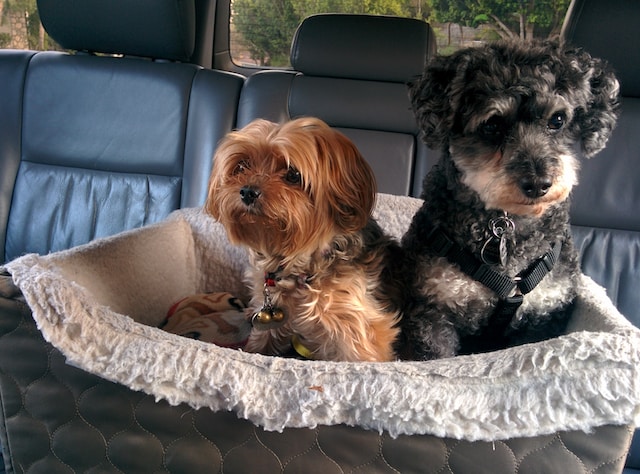With summer now in full swing and the school holidays just around the corner, many of us will be planning trips away with the whole family, and that includes exploring the great outdoors with our dogs.
For many, the prospect of a staycation away from home often means a long journey in the car, so how can you make sure that your furry friend remains safe and calm during the trip to your summer destination?
We’ve asked the canine experts at tails.com to provide their top tips on how to prepare your dog for a comfortable and stress-free road trip this summer.
How can you prepare your dog for a long roadtrip?
Before setting off for the summer, it is vital that you take the time to prepare your dog for the journey ahead, so they don’t become overly anxious or worried. You want to get them used to the space that they’ll be travelling in, and help them to understand that the car is a safe place to be, even when it’s for longer periods than they may be used to.
- Start by putting them in part of the car they will be travelling in, such as the boot or a crate with the door open, or their car seat and give them a treat to reward good behaviour – make sure you do this a few times to establish a pattern.
- Repeat this process again, but this time close the door, first with you beside them and then with you sitting in the driver’s seat.
- Once your dog is comfortable with the space, start by going on short journeys around the block, and then slowly build up the length of time you are driving with them to build up their tolerance towards longer car journeys.
- It’s also important that you go on practice drives and mix up what you do each time. For example, don’t go for a walk every time you drive, as you don’t want them thinking every drive in the car is going to result in a fun activity or new place to explore.
What else do you need to think about?
As well as physically preparing your dog for the long journey ahead, before taking a road trip there are a number of things to consider.
Tracker
Using a tracking device such as a PET Finder 4G GPS Tracker is the number one thing you need to ensure your dog’s safety whilst travelling with them. Anything could happen where they can easily slip away and without familiar surroundings, it could be impossible to find them again. With a tracker, you’ll know exactly where your pet is at all times for complete peace of mind!
Space
Try thinking about the space that you are putting your dog in. If you have a hatchback or longer car, the safest place for your dog is in the back behind the seats in a purpose-built crate. This way they have a dedicated space where they can move around or get into a new comfortable position as often as they want throughout the journey. If this isn’t an option you may want to consider a dog seat with a restraint, and car seat cover or dog seat belt.
Temperature
During summer, temperatures in your car can heat up fast, so it’s vital to take the right steps to ensure your dog keeps cool during long journeys. The first thing to consider is whether your dog will actually stay cool in the back of the car. While your car might boast air conditioning, a lot of the time it doesn’t actually reach the boot area.
To test whether your dog will stay cool enough, try sitting where your dog is going to be with the engine running, and seeing if it reaches you. If not, set a fan up or create shade on the windows that won’t obstruct your views, and be sure to roll down the back windows so air circulates into the car to keep your pooch as cool as possible.
Comfort
You also need to consider whether the space your dog is travelling in is comfortable for them. To keep your furry friend happy, make sure you give them a soft surface to lie on, such as veterinary bedding, or even their bed if it fits for an additional sense of home comfort.
Surroundings
While you might have prepared your dog ahead of your long road trip, to keep them as calm and relaxed as possible throughout the journey, it might be worth blocking how much they can see from windows. Traffic whizzing by especially – if you’re on a motorway – can be scary, so window blinds that block their view are a potential solution.
Treats and water
When humans take long journeys, we often pack lots of treats and water to keep us hydrated and full, and the same should go for our pets. If you’re worried about spilling water on the journey, try investing in a non-spill water bowl that can be left in your dog’s crate, so they can help themselves to it whenever they need a drink. Just be sure to schedule in lots of toilet stops along your route!
What if my dog gets travel sick?
Canine companions can get travel sick, especially puppies or younger dogs that aren’t as acquainted with car travel. Like humans, most dogs will outgrow travel sickness eventually, but there are a number of things you can do to help avoid it in the meantime.
- First and foremost, training your dog to get used to the car will help with easing travel sickness. If you slowly build up the amount of time they spend in the car and provide a soothing and comforting presence to your dog, then in the long run it will help to reduce any travel anxiety they may be feeling that contributes to car sickness.
- You might also want to consider driving as smoothly as possible, (where you can help it) as this can reduce any nausea your dog might be feeling.
- You could also try using toys that you keep specifically for journeys, so that your dog learns to associate travel with it, making the journey something to look forward to for them.
- Feeding your dog at least 30 minutes before travelling will also help to reduce the risk of your dog feeling nauseated
- Make sure to stop often during your journey. Stopping will allow your pooch to stretch their legs and get some fresh air which will help to reduce motion sickness and anxiety.
- If your dog struggles with travel sickness you may also want to contact your vet, who might be able to provide anti-sickness tablets for your dog to help keep their nausea at bay.

